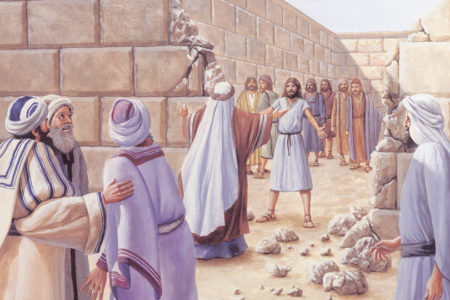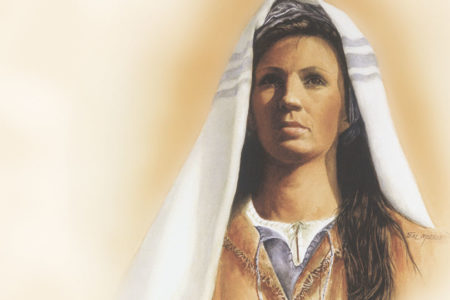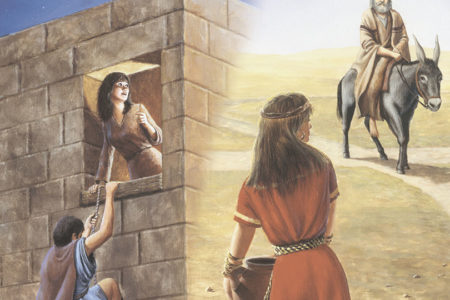Jesus Christ and the Future Kingdom of God Part Eight
In the previous article, we noted that the Kingdom of God has at least two aspects, or expressions: the universal and the theocratic. The universal Kingdom is the rule of God administered directly or indirectly over the entire universe (including the earth) and everything in it. This aspect has existed continually since God created the universe.
The second is the theocratic Kingdom of God, which is more limited in scope. It is only one expression, or aspect, of the universal Kingdom; and it is restricted to the administration of God’s rule through a human agent over the earth alone. It also is restricted to two time periods for this present earth: the time between man’s creation and fall and the time of the future Millennium. Thus the theocratic Kingdom of God constitutes the first and last phases of God’s universal Kingdom-rule over this present earth. It does not exist continually throughout world history.
Christ’s References to the Kingdom
Given these distinctions, to which of these aspects of the Kingdom of God was Jesus Christ referring when He said, “the kingdom of God is at hand” (Mk. 1:15) and when He taught His disciples to pray, “Thy kingdom come” (Mt. 6:10)?
Jesus’ statement, “the kingdom of God is at hand,” indicated that there was some sense in which the Kingdom was not yet present. The fact that He taught His disciples to pray for God’s Kingdom to come indicated the same thing. That prayer was a petition, asking that God’s Kingdom come, in some sense, in the future.
Since the universal Kingdom has existed continually since God created the universe, that aspect was already present when Christ indicated that there was still some way in which the Kingdom of God had not yet arrived. Evidently, Christ was not referring to the universal Kingdom aspect of the Kingdom of God in His statement and teaching on prayer.
However, since the theocratic Kingdom ceased to exist after the fall of man, that aspect of the Kingdom of God was not present when Christ said, “the kingdom of God is at hand.” Thus it is the theocratic Kingdom of God that corresponds to what Christ’s statement indicated—that there was some sense in which the Kingdom of God was not yet present.
The same holds true with regard to Christ’s model for prayer. Christ taught His disciples to pray for God’s Kingdom to come in the future. The theocratic Kingdom of God will exist again during the future Millennium when Christ Himself will reign for 1,000 years. It will be the last phase of God’s universal Kingdom-rule over this present earth. Thus the theocratic Kingdom aspect of the Kingdom of God matches the sense of the Kingdom of God involved in the prayer that Christ taught.
In both instances, therefore, Christ was referring to the future theocratic Kingdom of God, not to the universal Kingdom. Clearly, he indicated that the theocratic Kingdom of God was not yet present but would be in the future.
The Meaning of Christ’s Reference
Since Christ referred to the future theocratic Kingdom of God in His statement and model for prayer, what did He mean when He indicated that the Kingdom was “at hand”?
Normally, when people say that something is “at hand,” they mean that it is near. Consequently, when Christ said, “the kingdom of God is at hand,” He indicated that there was some sense in which the future theocratic Kingdom of God was near while He was present on earth. In fact, the word translated “is at hand” means “approach, come near,”1 and the tense indicates that Christ was saying, “The kingdom of God has come near.” But in what sense was it near then?
It was near in the sense of its potential for establishment in the world. Because Jesus Christ, who possessed the power necessary to establish the future theocratic Kingdom of God, was present on earth, that Kingdom had the potential to be established while He was here. That is what Christ meant when He said, “The kingdom of God is at hand”; and that is why He taught His disciples to pray, “Thy kingdom come.”
The Requirements for the Kingdom
What is required before the theocratic Kingdom of God can be reestablished in the world? John the Baptist (Mt. 3:1–2), Jesus Christ (Mt. 4:17; Mk. 1:15), and the apostles of Christ (Mt. 10:1–3, 7) all declared that the future theocratic Kingdom was “at hand.” Their message also referred to that Kingdom both as “the kingdom of heaven” and the “kingdom of God.” But the fact that both versions of the message are designated “the gospel of the kingdom” (Mt. 4:17, 23; Mk. 1:14–15) indicates that both referred to the same Kingdom. Thus John the Baptist, Christ, and His apostles all indicated that the future theocratic Kingdom of God was near in the sense of its potential for establishment in the world while Christ was present on earth.
Yet the gospel of the Kingdom included more than the declaration that the future theocratic Kingdom was near. It also included a twofold command for its hearers: They were to believe that it was near (“believe the gospel” [Mk. 1:15]), and they were to repent because that Kingdom was near (“Repent; for the kingdom of heaven is at hand” [Mt. 3:2; 4:17]).
The declaration that the Kingdom was at hand, combined with the command to believe and repent, implied that the theocratic Kingdom would not be established until the hearers of that gospel obeyed its twofold directive. In other words, the Kingdom would not be established until the hearers believed in the content of that gospel and repented.
The Distinctions Related to the Gospel of the Kingdom
The New Testament contains two different gospel messages: the gospel of the Kingdom and the gospel concerning Christ. The latter was defined by the apostle Paul in 1 Corinthians 15:1–5. Three distinctions reveal that they are not the same message.
Distinction in Content. The gospel of the Kingdom and the gospel concerning Christ were unlike in content. Whereas 1 Corinthians 15 spoke of the death, burial, and resurrection of Jesus Christ, the gospel of the Kingdom said nothing about those things.
The record of Jesus sending His apostles to preach the gospel of the Kingdom is found in Matthew: “These twelve Jesus sent forth, and commanded them, saying, . . . And as ye go, preach, saying, The kingdom of heaven is at hand” (10:5, 7). Jesus did not include His coming death, burial, and resurrection in the content of that message.
Matthew verified that fact when he recorded something that had happened after the apostles had been preaching the gospel of the Kingdom for some time: “From that time forth began Jesus to show unto his disciples, how he must go unto Jerusalem, and suffer many things from the elders and chief priests and scribes, and be killed, and be raised again the third day” (16:21). The language indicates that although the apostles had already been preaching the gospel of the Kingdom, Jesus had never told them about His coming death, burial, and resurrection. Thus the apostles had not been proclaiming those things while they were preaching the gospel of the Kingdom.
In addition, Peter’s negative reaction to that new revelation from Jesus demonstrated that the gospel of the Kingdom, which he had been preaching for some time, said nothing about the death, burial, and resurrection of Christ: “Then Peter took him, and began to rebuke him, saying, Be it far from thee, Lord; this shall not be unto thee” (Mt. 16:22). If Peter had already been preaching Jesus’ death, burial, and resurrection, he would not have reacted so strongly to Christ’s revelation of it.
The fact is that the apostle Paul defined a second gospel in 1 Corinthians 15:1–5 when he wrote,
Moreover, brethren, I declare unto you the gospel which I preached unto you, which also ye have received, and in which ye stand; By which also ye are saved, if ye keep in memory what I preached unto you, . . . For I delivered unto you first of all that which I also received, that Christ died for our sins according to the scriptures; And that he was buried, and that he rose again the third day according to the scriptures; And that he was seen.
In contrast with the gospel of the Kingdom, this gospel that Paul preached and defined focused on the death, burial, and resurrection of Christ. However, it said nothing about the Kingdom of God being at hand.
Distinction in Commission. The gospel of the Kingdom and the gospel concerning Christ also had distinct commissions associated with them. When Christ sent the apostles to preach the gospel of the Kingdom, He gave them a restricted commission. He said, “Go not into the way of the Gentiles, and into any city of the Samaritans enter not; But go, rather, to the lost sheep of the house of Israel. And as ye go, preach, saying, The kingdom of heaven is at hand” (Mt. 10:5–7).
In contrast, after Christ died and rose from the dead, He gave the apostles a universal commission. He said, “Go ye into all the world, and preach the gospel to every creature” (Mk. 16:15); and “Go ye, therefore, and teach all nations” (Mt. 28:19). This universal commission was associated with the gospel concerning Christ because Paul signified that the gospel that he preached focused on Christ’s crucifixion and “is the power of God unto salvation to everyone that believeth,” whether Jew or Gentile (Rom. 1:16; 1 Cor. 1:23–24).
Distinction in Preparation for Ministry. The third distinction is that these two gospels had different preparations for ministry associated with them. When Christ commissioned the apostles to preach the gospel of the Kingdom just to Israel, He ordered them not to take extra provisions for their ministry (Mt. 10:9–10). In contrast, when it became obvious that Israel would reject Christ and His gospel of the Kingdom and that the gospel of 1 Corinthians 15 would become reality, Jesus commanded the apostles to take extra provisions for ministry (Lk. 22:35–36).
The next article will consider the reason for the distinctions associated with the gospel of the Kingdom.







